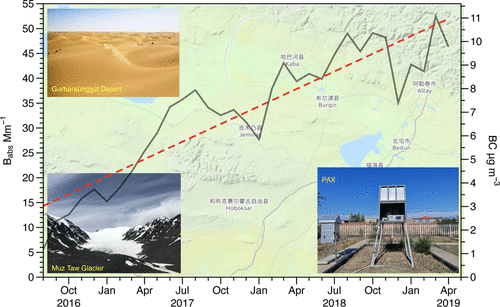当前位置:
X-MOL 学术
›
ACS Earth Space Chem.
›
论文详情
Our official English website, www.x-mol.net, welcomes your feedback! (Note: you will need to create a separate account there.)
Aerosol Optical Properties Measured Using a PAX in Central Asia from 2016 to 2019 and the Climatic and Environmental Outlooks
ACS Earth and Space Chemistry ( IF 3.4 ) Pub Date : 2021-01-05 , DOI: 10.1021/acsearthspacechem.0c00306 Lin Wang 1 , Xin Zhang 1 , Jing Ming 2
ACS Earth and Space Chemistry ( IF 3.4 ) Pub Date : 2021-01-05 , DOI: 10.1021/acsearthspacechem.0c00306 Lin Wang 1 , Xin Zhang 1 , Jing Ming 2
Affiliation

|
Aerosol optical properties, including absorption and scattering coefficients (Babs and Bscat), extinction coefficient (Bext), single scattering albedo (SSA), and so forth, are critical metrics to estimate the radiative balance of the atmosphere. However, their ground measurements are sparsely distributed in the world, where Central Asia is void in these measurements. We had been performing the measurements of AOPs and BC with a photoacoustic extinctiometer (PAX) in Jimunai, a border town of China neighboring Kazakhstan, Central Asia, from Aug 2016 to Apr 2019. This three-year study first reported statistically significant trends of Babs, Bscat, Bext, SSA, and derived concentrations of BC (Mann-Kendall trend test, p-value 0.05) in the Central-Asian area. Babs and Bscat show increasing trends and SSA was decreasing determined by the greater increasing pace of Babs than Bscat. Seasonal and diurnal variations of the AOPs were associated with climate shift and residents’ commute activity, respectively. The difference in the magnitudes and trends of AOPs between the measurements and satellites’ observations advise that more care should be invested when choosing remote-sensing data to represent the AOPs at a specific site. The increasing trend of derived BC concentrations is reflected in the deposition record of BC in a snowpit of the nearby Muz Taw glacier. We suppose that the dramatically increasing BC particles emitted from Jimunai are significant factors triggering the melting of the adjacent mountain glaciers. The outflow of dust from the neighboring Gurbantünggüt Desert could occasionally invade into Jimunai and deteriorate the local air quality, as evidenced by a probable dust event captured by the PAX on Feb 15, 2018. Finally, we outlook the future perspectives of measurements in Jimunai as a long-standing station.
更新日期:2021-01-21



























 京公网安备 11010802027423号
京公网安备 11010802027423号